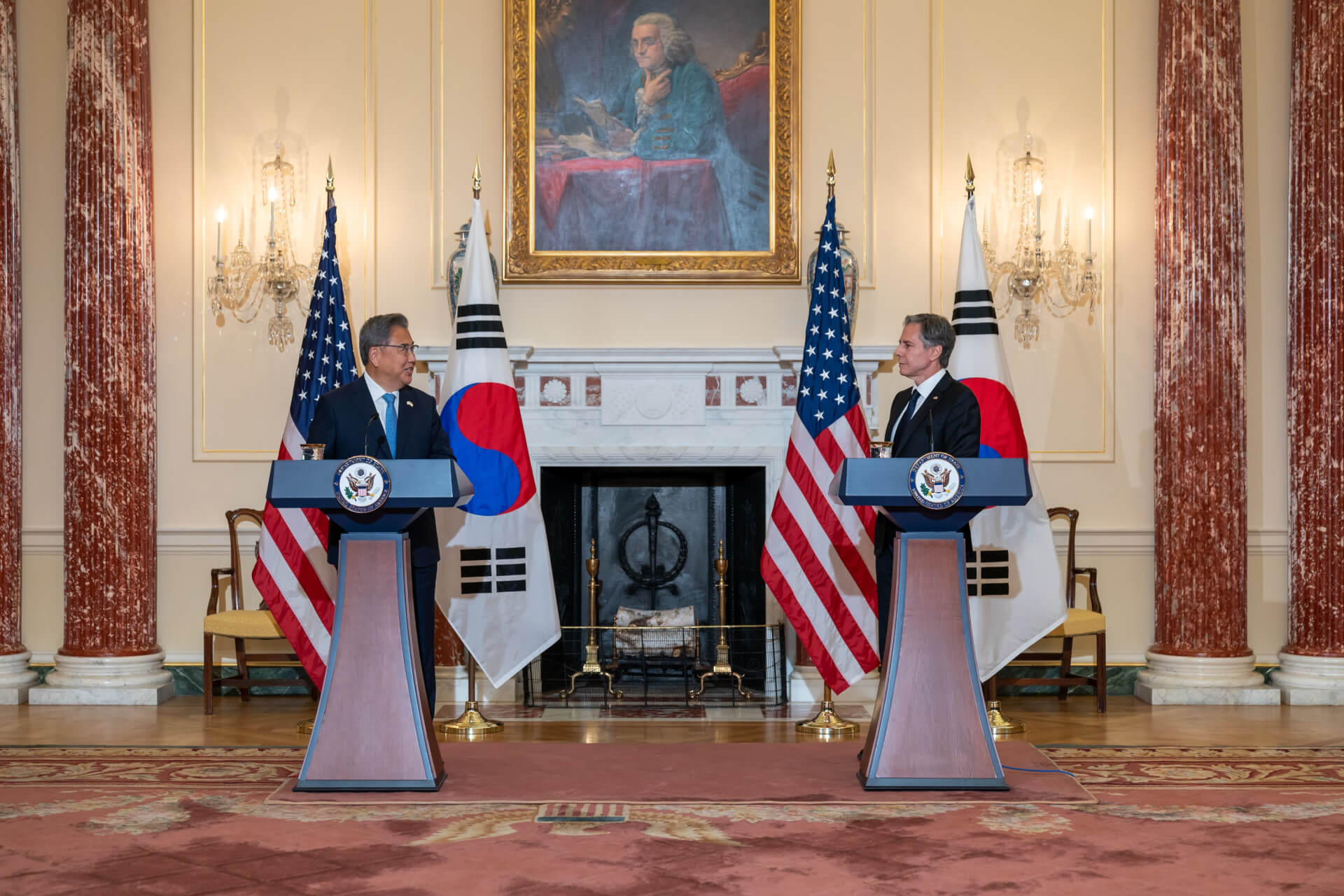In a joint press conference with his American counterpart Antony Blinken in Washington on Monday, South Korean Foreign Minister Park Jin reaffirmed that a seventh nuclear test by North Korea will be met with a “united and firm” response by their alliance, while Blinken reiterated that Washington and Seoul have “no hostile intent” toward Pyongyang and are “open to dialogue without preconditions.”
Both leaders stated that they are aware that North Korea has already made preparations for a nuclear test, and is only waiting for a “political decision” before conducting it. Blinken remarked that in the event of a nuclear test, the US is ready with all contingencies, and prepared to make “both short and longer-term adjustments to our military posture”. “It will only isolate North Korea from the international community,” Park added.
.@SecBlinken met with @FMParkjin today to reaffirm the importance of the U.S.-ROK alliance in maintaining the security and stability of the Indo-Pacific. https://t.co/Lm98tH03fE
— Ned Price (@StateDeptSpox) June 14, 2022
Just last week, the US introduced a new resolution in the United Nations Security Council (UNSC) seeking additional sanctions against North Korea that was vetoed by Russia and China. On this topic, Park stated, “If North Korea somehow decides to go ahead with this nuclear test then… I also think that China should play a very positive role to persuade North Korea that maintaining peace and stability on the Korean Peninsula requires their new thinking and also making a right decision at this important, critical juncture.”
Blinken added that “Until the regime in Pyongyang changes course, we will continue to keep the pressure on” by imposing additional sanctions and strengthening their extended deterrence through expanded combined military drills to create a “safe environment” in the Korean peninsula. Park also mentioned that they agreed on the “early reactivation” of the high-level Extended Deterrence Strategy and Consultation Group (EDSCG), including the “timely deployment of strategic assets when necessary”, which he opined will send a firm message to North Korea.
The EDSCG was deactivated in 2018 following three inter-Korean meetings and two historical summits between North Korean Supreme Leader Kim Jong Un and former US President Donald Trump in 2018 and 2019. However, it did not lead to any lasting solutions on denuclearisation.
The meeting came just a day after North Korea fired artillery shots from multiple rocket launchers following an important party meeting in Pyongyang during which Supreme Leader Kim Jong-un supposedly said, “The right of self-defence is precisely the issue of defending sovereignty.” In response, the South Korean presidential national security office conducted a meeting to reaffirm Seoul’s military readiness, expressing “concerns about North Korea upgrading its weapons systems that pose a direct threat to the security of South Korea.”
Had a very productive meeting today with @FMParkJin. We discussed the need for our countries to strengthen our alliance and economic cooperation as we grow into a global partnership where we work closely together on the most pressing challenges of the 21st century. pic.twitter.com/kg8trcJzjB
— Secretary Antony Blinken (@SecBlinken) June 14, 2022
Pyongyang has conducted 18 weapons tests, including 33 rockets and six Intercontinental Ballistic Missiles (ICBMs), this year. Furthermore, Kim has vowed to “continue to take steps to strengthen and develop” the country’s nuclear capabilities “at the highest possible speed.”
Both American and South Korean intelligence agencies have warned that the country is gearing up for its seventh nuclear test following a five-year hiatus. In fact, South Korea’s National Intelligence Service has said North Korea has already “completed its preparations.” To this end, US spy satellites have spotted new tunnels in areas where such tests have taken place in the past.
During his visit to Washington, D.C., Minister of Foreign Affairs Park Jin(@FMParkJin) met with U.S. Secretary of Energy, Jennifer Mulhern Granholm, on June 13. Both sides welcomed that the ROK and the U.S. affirmed their shared commitment (1/2) pic.twitter.com/ZGBrUEcQ4t
— MOFA (@MOFAkr_eng) June 14, 2022
In this regard, the Association of Southeast Asian Nations (ASEAN), too, has expressed “grave concern” and called on the rogue nation to exercise self-restraint and comply with UNSC resolutions while pursuing diplomacy to reduce tensions. “ASEAN emphasises that achieving peace and stability will also mean greater development and prosperity for the Democratic People’s Republic of Korea (DPRK), the region and the world,” a statement by the Association said.
The test-firing of all the 33 missiles has cost Pyongyang about $650 million, which would have been enough to mitigate the brewing food and COVID-19 crises brewing in the country. “This shows that the regime’s wrongful policy is responsible for North Korean people’s poor health and poverty. It’s wrong to think we should give unconditional assistance to the North,” South Korea’s People Power Party lawmaker Shin Won-sik of the National Assembly’s Defense Committee said.
"South Korea, Japan and the US on Saturday agreed to regularize and publicize trilateral missile defense exercises and come up with further trilateral actions to deter North Korea’s ballistic missile threats."
— The Korea Society (@koreasociety) June 13, 2022
@TheKoreaHerald @dagyumjihttps://t.co/YFWXPOxcBV pic.twitter.com/X8hiWM5cRG
Echoing Shin, Park also stated that North Korea should “spend their budget for the well-being of the people” rather than spending on conducting missiles and nuclear tests.
Against this backdrop, it is believed that South Korea, the US, and Japan are planning to conduct a combined missile search and tracking drills in Hawaii from August 1-14 in an effort to boost their military preparedness to counter North Korea’s evolving missile threats. Canada and Australia may also participate in the biennial Pacific Dragon exercise, according to sources. Furthermore, Seoul, Washington, and Tokyo will also partake in their quarterly combined missile warning exercise later this year.
In fact, the three countries participated in trilateral diplomatic talks in Seoul just last week, in which they “strongly condemned” the recent “unlawful” ballistic missile launches by North Korea and urged it to return to negotiations. Furthermore, Biden met with both South Korean President Yoon Suk-Yeol and Japanese Prime Minister Fumio Kishida during separate meetings on his Asia tour last month.

